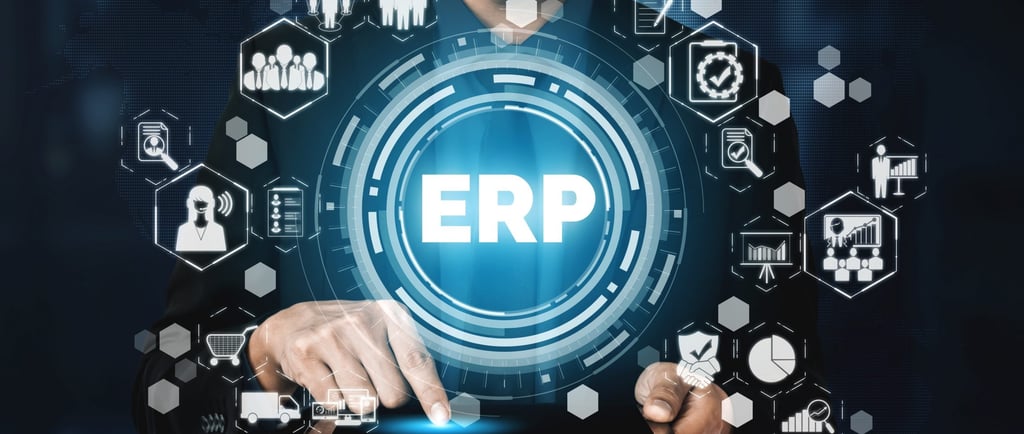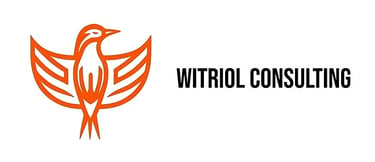The Future of ERP Implementation in the Consulting Industry
Enterprise Resource Planning (ERP) systems are crucial in the modern business landscape, serving as the backbone for integrating and managing various business processes across an organization. The future of ERP implementation in the consulting industry is poised for significant transformation, driven by advancements in technology, changing business needs, and evolving market dynamics. As an executive consultant, understanding these trends and their implications is essential for delivering value to clients and maintaining a competitive edge. This article explores the future of ERP implementation, focusing on key trends, challenges, and opportunities that will shape the consulting industry.
ERPCONSULTINGTECHNOLOGYCLOUDFINANCEMANAGEMENT CONSULTING
Shaun Witriol
7/22/20244 min read


Enterprise Resource Planning (ERP) systems are crucial in the modern business landscape, serving as the backbone for integrating and managing various business processes across an organization. The future of ERP implementation in the consulting industry is poised for significant transformation, driven by advancements in technology, changing business needs, and evolving market dynamics. As an executive consultant, understanding these trends and their implications is essential for delivering value to clients and maintaining a competitive edge. This article explores the future of ERP implementation, focusing on key trends, challenges, and opportunities that will shape the consulting industry.
1. Cloud-Based ERP Solutions
The shift towards cloud-based ERP solutions is one of the most transformative trends in the consulting industry. Traditional on-premises ERP systems are being replaced by cloud-based alternatives, offering greater flexibility, scalability, and cost-efficiency. Cloud ERP solutions enable businesses to access their systems from anywhere, facilitating remote work and global operations.
Key Benefits:
Scalability: Cloud ERP systems can easily scale to accommodate business growth, allowing organizations to add or remove users and modules as needed.
Cost Efficiency: By eliminating the need for extensive hardware and infrastructure, cloud ERP reduces upfront costs and ongoing maintenance expenses.
Flexibility: Businesses can customize cloud ERP solutions to meet their specific needs, integrating with other cloud services and applications.
As an executive consultant, advising clients on the benefits of cloud ERP and guiding them through the migration process will be a critical component of future ERP implementation projects.
2. Artificial Intelligence and Machine Learning Integration
Artificial Intelligence (AI) and Machine Learning (ML) are revolutionizing ERP systems by enhancing automation, data analysis, and decision-making capabilities. Integrating AI and ML into ERP systems enables businesses to gain deeper insights from their data, predict trends, and optimize operations.
Applications of AI and ML in ERP:
Predictive Analytics: AI-powered ERP systems can analyze historical data to forecast future trends, helping businesses make informed decisions.
Process Automation: AI can automate routine tasks, such as invoice processing and inventory management, reducing manual effort and minimizing errors.
Enhanced User Experience: AI-driven chatbots and virtual assistants can improve user interactions with ERP systems, providing real-time support and guidance.
Consultants must stay abreast of AI and ML advancements to help clients leverage these technologies for competitive advantage and operational efficiency.
3. Enhanced User Experience and Mobility
The future of ERP implementation will focus on enhancing user experience and mobility. Modern ERP systems are being designed with user-friendly interfaces and mobile capabilities, ensuring that employees can access critical information and perform tasks on the go.
Key Features:
Intuitive Interfaces: Simplified and intuitive interfaces improve user adoption and reduce the learning curve associated with ERP systems.
Mobile Access: Mobile-friendly ERP applications enable employees to access data and perform tasks from their smartphones and tablets, increasing productivity and responsiveness.
Personalization: ERP systems are becoming more personalized, allowing users to customize their dashboards and workflows to suit their roles and preferences.
As an executive consultant, ensuring that ERP implementations prioritize user experience and mobility will be essential for driving user adoption and maximizing the system's benefits.
4. Integration with IoT and Big Data
The Internet of Things (IoT) and Big Data are reshaping the ERP landscape by providing real-time data from connected devices and vast amounts of information for analysis. Integrating IoT and Big Data with ERP systems enables businesses to monitor operations in real time, optimize processes, and make data-driven decisions.
Examples of Integration:
Real-Time Monitoring: IoT devices can provide real-time data on manufacturing processes, equipment performance, and supply chain activities, allowing for immediate action and optimization.
Data Analytics: Big Data analytics tools integrated with ERP systems can analyze large volumes of data to uncover patterns, trends, and insights that inform strategic decisions.
Predictive Maintenance: IoT sensors can monitor equipment health and predict maintenance needs, reducing downtime and extending asset life.
Consultants will need to develop expertise in IoT and Big Data technologies to help clients harness the full potential of their ERP systems and achieve operational excellence.
5. Security and Compliance
As ERP systems become more interconnected and accessible, ensuring security and compliance will be a top priority. Cybersecurity threats and regulatory requirements are becoming increasingly complex, necessitating robust security measures and compliance frameworks.
Key Considerations:
Data Security: Implementing advanced security protocols, such as encryption and multi-factor authentication, to protect sensitive business data.
Regulatory Compliance: Ensuring that ERP systems comply with industry-specific regulations and standards, such as GDPR, HIPAA, and SOX.
Continuous Monitoring: Implementing continuous monitoring and auditing processes to detect and respond to security threats in real time.
As an executive consultant, providing guidance on security best practices and helping clients navigate regulatory requirements will be crucial for successful ERP implementations.
6. Agile Implementation Methodologies
The traditional waterfall approach to ERP implementation is being replaced by agile methodologies that emphasize flexibility, collaboration, and iterative progress. Agile implementation allows for more rapid delivery of value, continuous improvement, and better alignment with business needs.
Agile Methodologies:
Scrum: Utilizing short, time-boxed iterations (sprints) to deliver incremental improvements and gather feedback.
Kanban: Visualizing work and optimizing workflow to increase efficiency and reduce bottlenecks.
Lean: Focusing on eliminating waste and delivering maximum value with minimal resources.
Consultants will need to adopt agile methodologies to enhance project outcomes, reduce implementation timelines, and increase client satisfaction.
7. Future-Proofing ERP Systems
Future-proofing ERP systems involves designing and implementing solutions that can adapt to evolving business needs and technological advancements. This requires a strategic approach to ERP implementation, ensuring that systems are scalable, flexible, and easily upgradable.
Strategies for Future-Proofing:
Modular Architecture: Implementing ERP systems with modular architecture allows businesses to add or upgrade functionalities without disrupting existing operations.
Continuous Improvement: Encouraging a culture of continuous improvement and regular system upgrades to keep pace with technological advancements.
Vendor Collaboration: Building strong relationships with ERP vendors to stay informed about new features, updates, and best practices.
As an executive consultant, advising clients on future-proofing strategies will be essential for ensuring long-term success and resilience.
Conclusion
The future of ERP implementation in the consulting industry is characterized by rapid technological advancements, evolving business needs, and a growing emphasis on flexibility, security, and user experience. As an executive consultant, staying ahead of these trends and continuously enhancing your expertise will be crucial for delivering value to clients and maintaining a competitive edge. By embracing cloud-based solutions, AI and ML integration, enhanced mobility, IoT and Big Data, security and compliance, agile methodologies, and future-proofing strategies, consultants can help businesses achieve operational excellence and sustained growth in an ever-changing landscape.
Current Certifications
Small Local Business Enterprise (SLBE) - (San Diego)
Local Small Business Enterprise - (LSBE) - (Los Angeles)
Minority Owned Business (MBE) - (San Diego and Los Angeles, Federal)
Small Business (Micro) - (California)
Disadvantaged Business Enterprise - (California, Arizona, Oregon, Hawaii)
Small Disadvantaged Business - (Federal)
Asian Pacific Business Enterprise - (Federal)
Pending Certifications
8a - (Federal)
© 2024. All rights reserved.


certifications
consultations
